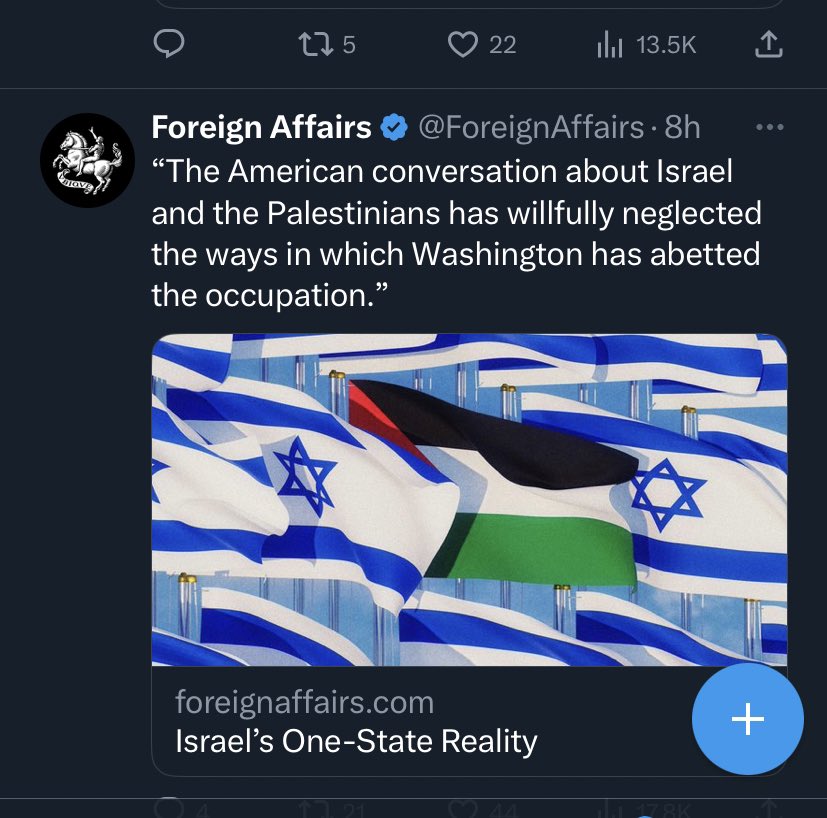
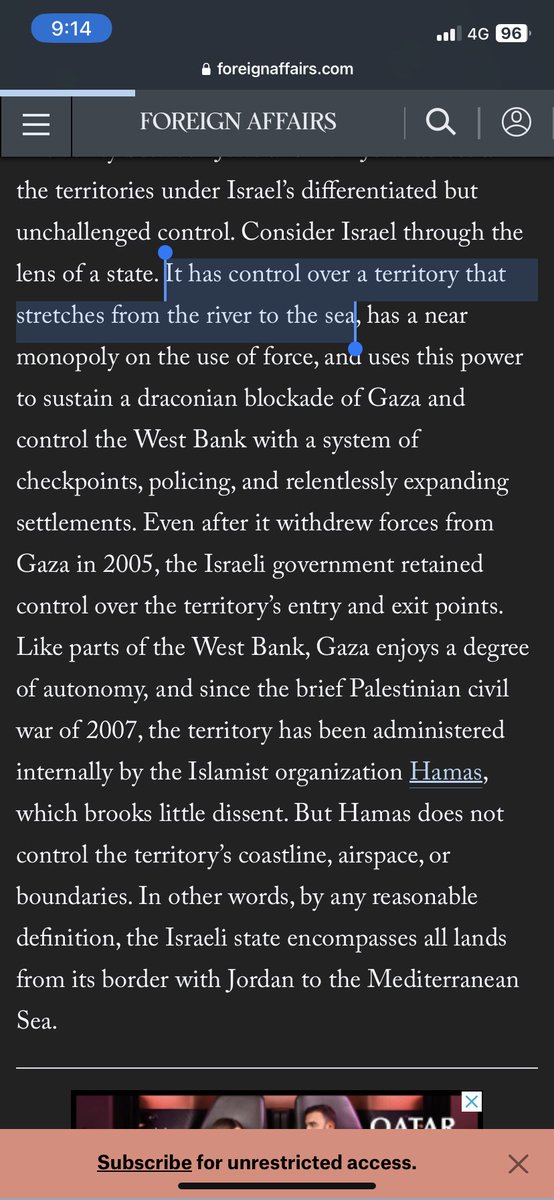
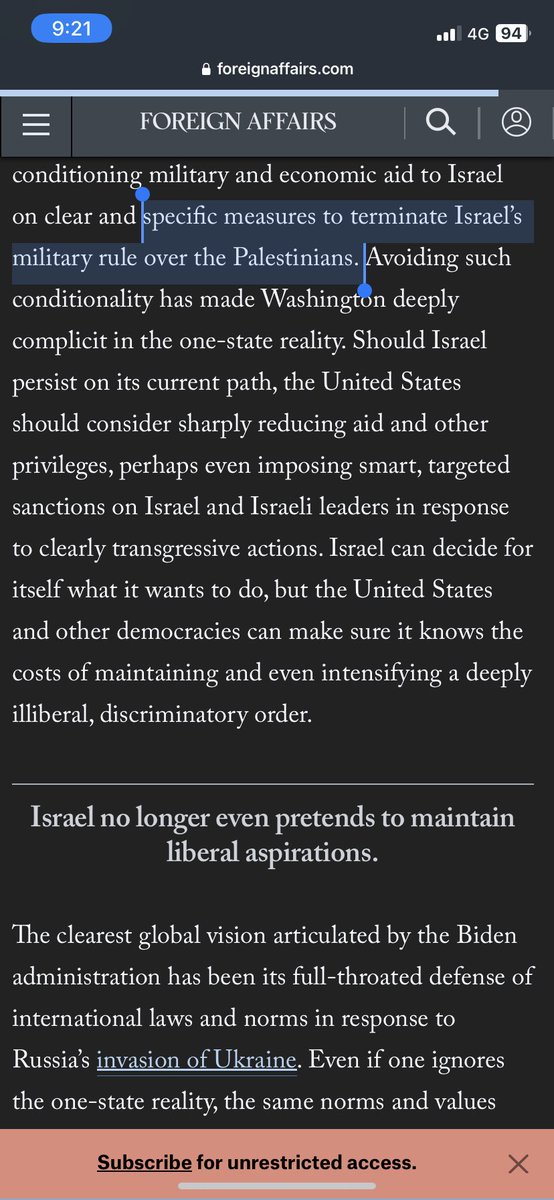
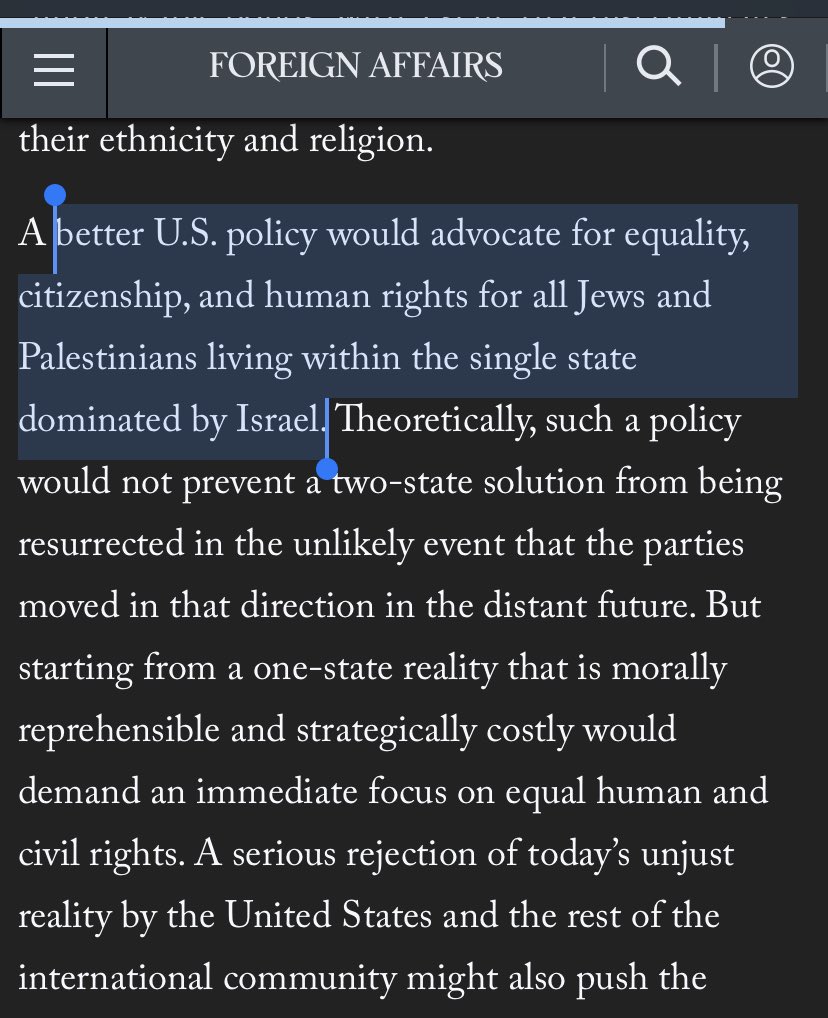

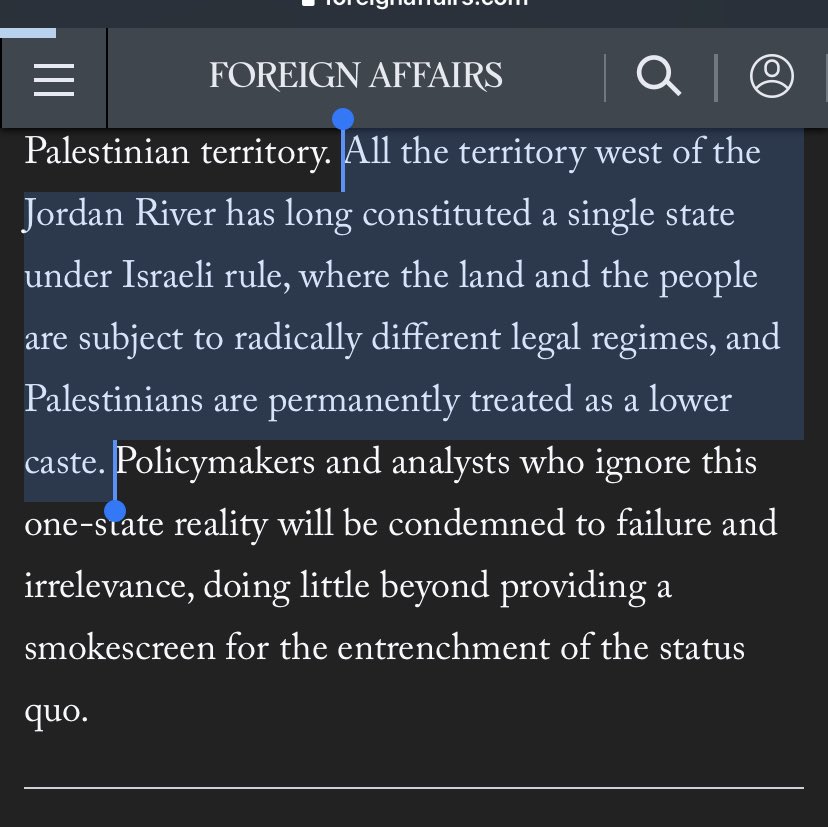
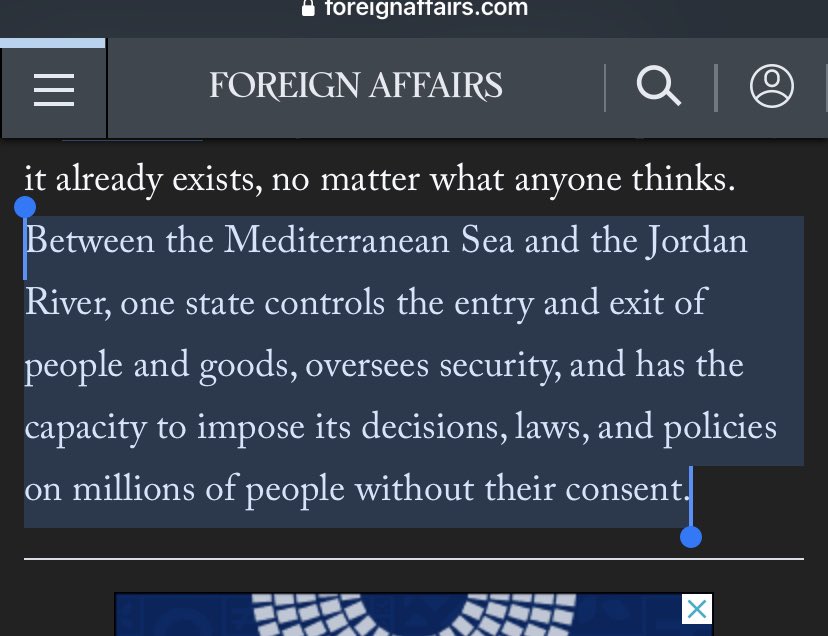
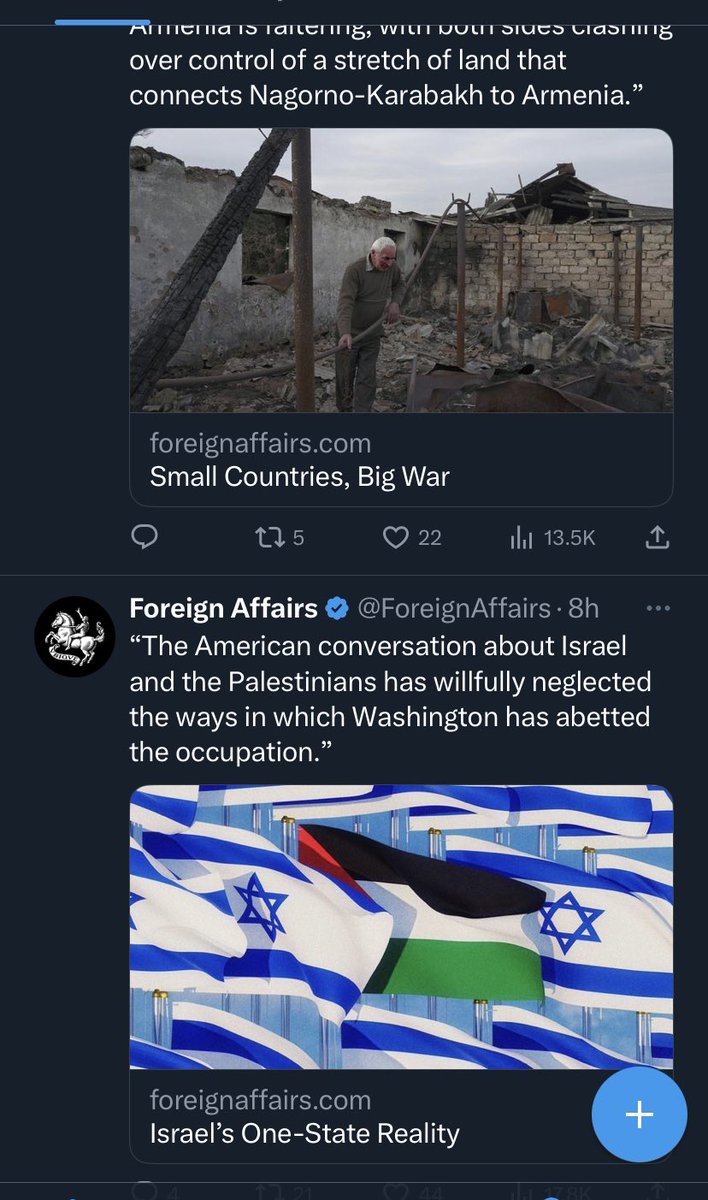
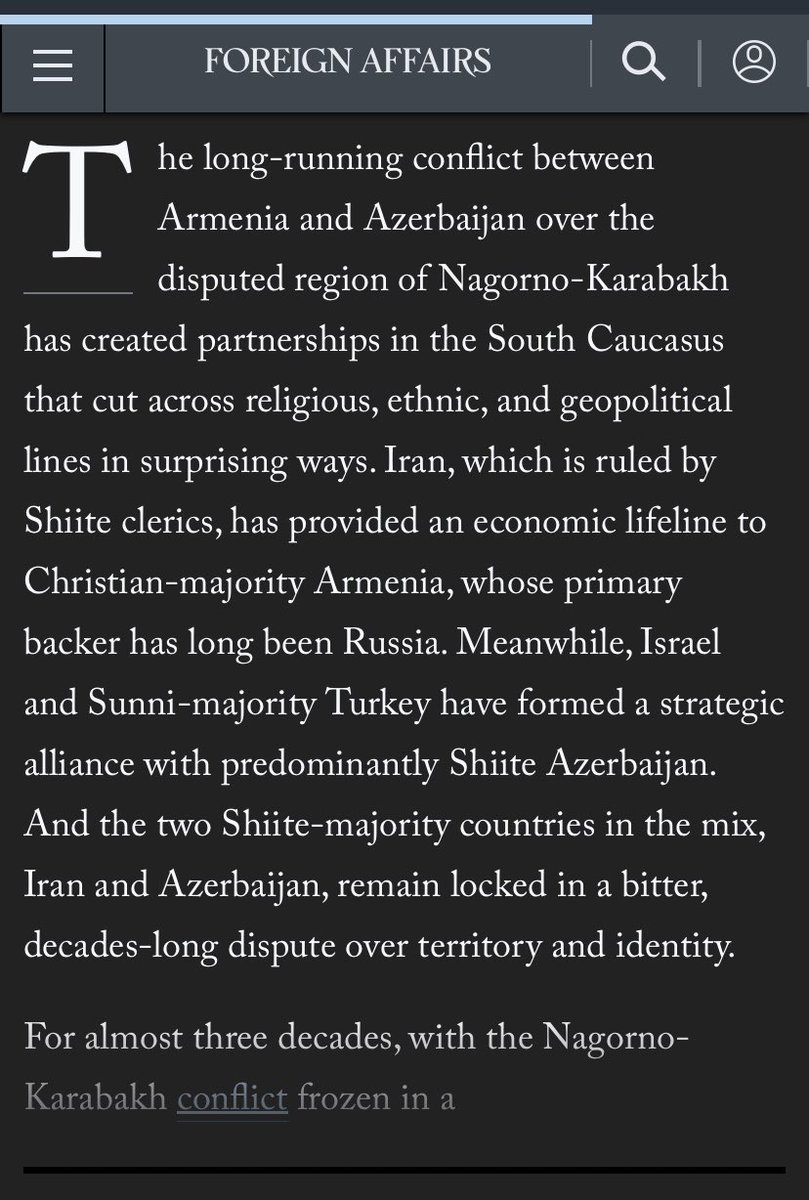
|
Or order from your favorite bookseller, using ISBN 9798985708424. Read all about it here! |

|
 Elder of Ziyon
Elder of Ziyon








|
Or order from your favorite bookseller, using ISBN 9798985708424. Read all about it here! |

|
 Ian
IanDo the Abraham Accords and the focus on Ukraine and China change things? Not really. The Abraham Accords are great, both in of themselves and because they got Netanyahu in 2020 to abandon his plan to annex parts of the West Bank. Ukraine and China reduce the spotlight on the Palestinian-Israeli conflict, always a good thing. But Israel’s thriving relations with the UAE and other states barely diminishes the Palestinian campaign of delegitimization. And whenever the Palestinian Authority or Hamas wishes the spotlight to return, it will do so, instantly.Blood libel: Kremlin claims organs harvested by Ukraine end up in Israel
How should Israel handle the international spotlight?
By recognizing it as a fact of life and finding ways to deal with it. When Hamas decides to launch missiles into Israel, it knows it will get clobbered militarily but will gain international political support. Likewise, Israel knows it will get clobbered internationally, so it should take advantage of the crisis to send a very strong message to the Gazan population that it has lost the war. Ultimately, media coverage matters less than winning on the ground.
Practically speaking, how does Israel win?
I prefer to posit Israel victory as a policy goal, without going into detailed strategy and tactics. First, it’s premature to get into specifics. Second, delving into these topics distracts from establishing the policy goal.
That said, Israel has an extraordinary range of levers due to its vastly greater power than the Palestinians – and not just military and economic.
One creative example: Saudi Crown Prince Mohammed bin Salman would probably love to add al-Aqsa to his collection of Islamic sanctities, especially at a time when Tehran challenges Saudi control of Mecca and Medina. How about Israel opening negotiations on this topic with Riyadh, offering the jewel in the Palestinian Authority’s crown in return for full diplomatic relations and a change in the status quo on the Temple Mount?
Can Israel defeat Hamas without reoccupying Gaza?
Again, I prefer not to discuss strategy and tactics. But, as you ask, here is one tactic: Israel announces that a single missile attack from Gaza means a one-day border closure: no water, food, medicine, or fuel crosses from it to Gaza. Two missiles means two days, and so forth. I guarantee this would rapidly improve Hamas’s behavior.
But isn’t the delegitimization issue a struggle against those in the West, too? Don’t they have to be defeated? Horrors, no. Plus, that would be impossible. But it is also not necessary, for they are mere followers. Imagine the Palestinians acknowledge their defeat and truly accept the Jewish state; this would pull the rug out from leftist anti-Zionism. Sustaining a more-Catholic-than-the-pope stance is tough to keep up. Israel is lucky that its principal enemy is so small and weak.
Over time, do Palestinians increasingly accept Israel?
Former minister Yuval Steinitz just told me that 75% of Palestinians have come to terms with the State of Israel and live normal lives, but I wonder. A recent Palestinian Center for Policy and Survey Research poll found that “72% of the public (84% in the Gaza Strip and 65% in the West Bank) say they are in favor of forming armed groups such as the Lions’ Den, which do not take orders from the PA and are not part of the PA security services; 22% are against that.”
Yes, there’s a general calm. In the hotel where we are meeting, the Dan Jerusalem on Mount Scopus, the Palestinian staff goes quietly about its work and is not stabbing anyone. But at a time of crisis, say a Hamas rocket attack, I would avoid this or most other Jerusalem hotels.
Israel’s previous leadership seems to accept Micah Goodman’s idea of “shrinking the conflict.” Do you?
No, I see it as just another in a long line of attempts to finesse the difficult work of attaining victory. Prior ideas included expelling the Palestinians either by force or voluntarily, the Jordan-is-Palestine scheme, erecting more fences, finding a new Palestinian leadership, demanding good governance, implementing the Road Map, funding a Marshall Plan, imposing a trusteeship, establishing joint security forces, splitting the Temple Mount, leasing the land, withdrawing unilaterally, and so on. None worked; none will work. Defeat and victory remain imperative.
What about Iran? The Palestinian terrorist groups, like Hamas and Islamic Jihad, get support from Iran. If Iran’s regime falls, will that matter?
Regime change in Iran has vast implications for the Middle East but not so much for the Palestinian war on Israel. The mullahs’ political collapse will not close down the Palestinians’ conviction that rejectionism works, that “revolution until victory” will prevail, that they can eliminate the Jewish state. Israel cannot outsource victory.
A Russian former senior official argued the war in Ukraine became a very profitable battlefield for "black-market transplantologists," in a report picked up by several Russian media outlets.Taxpayer Dollars Could Reach Terrorists Under Biden Admin Aid Changes, McCaul Says
In an interview with Russian outlet Moskovskij Komsomolets, retired Major General of Police, and ex-head of the Russian Central Bureau of Interpol Vladimir Ovchinsky claimed the Armed Forces of Ukraine are delivered human organs harvested from the dead and wounded in the war, people who are still alive, such as Russian prisoners of war, and even Ukrainian civilians who happened to be at the wrong place at the wrong time.
When asked where the organs are transported to, Ovchinsky said: "The most effective and successful 'workshops' are located in four countries - Turkey, India, Israel and South Korea."
"Israel is also a leader in the field of innovative medical techniques, which are used throughout the world. The clinics of this country successfully perform organ transplant operations."
The former advisor to the interior minister of Russia also added that large amounts of medical equipment, including containers for transporting human organs, were sent to Ukraine since the beginning of Russia's invasion.
When asked what they do with the bodies, he replied: "They burn them like in Auschwitz or Dachau, they are after all heirs of Hitler. There is also information about mobile crematoria to burn the remains of people whose organs were removed."
Biden Treasury Department authorizations, announced late last year, rolled back safeguards on U.S. humanitarian aid, a move that is likely to pave the way for millions in taxpayer dollars to reach "designated terrorists, human rights abusers, and violent authoritarian regimes," according to a congressional foreign policy leader.
The authorizations, which will make it easier for aid dollars to be allocated in conflict zones and areas where terrorist activity is taking place are generating concerns in Congress. Rep. Michael McCaul (R., Texas), the incoming chair of the House Foreign Affairs Committee, said that in its rush to push aid dollars out the door, the Biden administration is relaxing longstanding safeguards meant to stop taxpayer aid from enriching malign regimes and terrorism supporters.
"By relaxing longstanding basic restrictions on the provision of aid to countries subject to U.S. sanctions, [the] action by the Biden administration increases the likelihood some of our assistance funding will go to designated terrorists, human rights abusers, and violent authoritarian regimes," McCaul said in a statement. "I urge the administration to reverse this decision."
As part of this recalibration, the Treasury Department issued authorizations that will inject U.S. taxpayer dollars into areas that have historically been subject to strict sanctions, including in China, Cuba, Taliban-controlled Afghanistan, Iran, and other conflict areas, according to congressional officials who reviewed the new initiative.
The Treasury Department changes, these sources said, remove longstanding restrictions that prevent U.S. aid from being injected into sanctioned areas. To skirt these restrictions, the United States will funnel taxpayer dollars to United Nations organizations working in these conflict zones.
The aid policy also protects U.N. organizations from repercussions should U.S. aid dollars end up in the hands of terrorists or other sanctioned entities, like the Taliban or Bashar Al-Assad’s regime in Syria, according to one congressional official tracking the matter.
Samantha Power, the U.S. Agency for International Development’s (USAID) administrator, acknowledged in a statement issued late last year that the new aid practices will grant blanket immunity to organizations operating in conflict areas.
 Ian
IanFrom the dawn of time, Jews have been maligned and slandered. Apion's vilification, the blood libels, the Dreyfus trial, and of course, the antisemitic propaganda of the 20th century are just a few examples. All of these manifestations of antisemitism got an "upgrade" to vilifying Israel, where the majority of world Jewry resides, by taking away the very legitimacy of Jewish presence in its ancestral homeland.Seth Frantzman: The UN's vote against Israel and its historic contradictions
This effort began when the Roman emperor Hadrian renamed the land of Israel "Palestine" in order to detach the Jews from their homeland. In a nutshell, the vilification of the Jew has evolved into the delegitimization of the State of Israel. Words have power, and we still suffer the consequences of those words written and spoken over the last two millennia.
Today, the effort to delegitimize Israel has gone global and has permeated organizations like the United Nations and Amnesty International, which routinely try to undermine Israel's right to exist as a Jewish and democratic state within any borders. Furthermore, with the democratization of communication due to the emergence of social media, the average person has been handed the power and platform to throw misinformed accusations at Israel with the click of a button.
Making matters worse, influencers and celebrities can reach three, four, or even ten times the number of all Jews on the planet, spreading incorrect information. They share inaccurate content out of ignorance (like the star of Netflix's hit show Wednesday, Jenna Ortega) or out of pure malice (like antisemite Kanye West). Thus, the average person, who forms their opinions, including geo-political stances, based on memes, Instagram stories and TikTok videos, will easily be misinformed by these influencers. I experienced this firsthand when my friends around the world would easily share misinformation, while terrorist organizations were unleashing thousands of rockets upon Israeli civilians.
This is the essence of the contradictory policies behind “international law.” Western colonial powers were able to set up various administrations all around the world, sometimes only for a few decades. During that time they often carved up areas and created arbitrary lines on maps and then partitioned the areas they had taken over. But the Western powers were rarely accused under international law of “illegal occupation.” The concept of “international law” was primarily inaugurated after western colonial powers left most areas of the world.What are possible legal ramifications of an ICJ advisory opinion on Israel?
The remaining vestiges of colonial-era rule, such as some islands here and there, are not considered “occupied.” In this narrative, Western countries never “occupied,” but when they decided to partition countries or draw arbitrary lines on maps, cutting peoples and tribal territories in half, it was always "legal." This was the case in the partition of India and the creation of the Kashmir dispute.
It was also the case with areas in the Middle East. The Golan Heights are part of Syria, not because of some ancient legal reason, but because the British and French colonial authorities demarcated the border this way. Neither side of that equation was ever “occupying.” Only when the European countries decided to give “independence” to various states or leave, did international law suddenly swoop in and say that the borders the former powers had drawn would be set in stone. Now any changes were against international law.
The strangest thing is that the partition plan the British and UN left behind in 1947 was unworkable. International status for Jerusalem and a patchwork of areas for two states, one Arab and one Jewish, in what had been British mandate Palestine. Yet the “law” today isn’t entirely based on the 1947 decision. Instead, there was a ceasefire in 1948 and then a war in 1967. International law has a way of swooping in only when changes are made in Israel’s favor.
For instance, there was no “occupation” of Jerusalem or “demographic change” issue between 1948 and 1967 when Jordan ran east Jerusalem. Even though Jews were ethnically cleansed from areas of the Old City, this was not a “demographic change.” When Israel took over Jordanian-occupied east Jerusalem, then international law says the situation in 1967 must be set in stone. Not the situation in 1947 or 1887. How does the law know when to draw the line?
Similarly, it’s not clear why international law often portrays Israel as an “occupier” of Gaza. The Gazans were not consulted on whether they wanted to be occupied by the British or the Egyptians. Yet the “law” seems to only relate to Israel’s temporary control of Gaza and in essence forces Israel to forever be the “occupying power.” This is the same international concept that underpins the Oslo Accords, in a sense abrogating those very accords and making it impossible for Israel to give up control. This is problematic because even if Israel wanted to withdraw from parts of the West Bank and enable a full-fledged Palestinian state, the “law” would always portray Israel as continuing to “occupy” something. This is the case in Lebanon, for instance, where even though Israel withdrew in 2000, Hezbollah continues to accuse Israel of occupying the Har Dov/Sheba’a farms area. It’s hard to imagine a way Israel can ever extricate itself from the endless UN focus, even if it wanted to. The focus on Israel is convenient since it means more contentious issues such as focusing on Turkey’s occupation of Syria, are not spotlighted. Many countries agree to shift the focus to Israel.
The related features of international law, that it is often rooted in arbitrary European colonial power decisions, and in arbitrary dates, create many contradictions. It’s hard not to see it as merely being made up as it goes along to single out Israel. Some of the countries that created the “law” and the chaos of 1948, then condemn Israel for controlling the very thing they created and also refuse to let Israel leave areas they demanded Israel leave. Increasingly this is a tool of countries in the global south and authoritarian regimes. Many western countries do not see the constant focus on Israel as helpful. Some countries have realized that letting Iran and Russia hijack international forums is also no longer helpful. It is unclear if there will be more pushback against these kinds of resolutions and decisions that focus on Israel.
International Legal Forum CEO and human rights attorney Arsen Ostrovsky, agreed that “Such opinions of the ICJ are non-binding on the parties involved. They are purely of an advisory nature,” but warned that “they do carry considerable moral weight and are regarded highly as a reference point by the legal community, as well as civil society and the United Nations.”
Daphné Richemond-Barak explained that the ICJ advisory opinion “doesn’t obligate a state as such” but the body could urge member states to take action. Member states could use the ruling as a basis to make political decisions. Whether the states’ local courts would use the advisory as legal precedent was not the main concern. The opinion was more relevant in international fora.
“It’s not so much what the opinion is going to say but how it's going to be used in the future,” she said.
Richemond-Barak gave the example of the 2004 ICJ advisory opinion on the security barrier, and how it became the keystone for many reports and resolutions by international bodies. The ICJ’s opinion of the legal consequences Israel’s practices and control of the territories would likely be held in high regard due to the court’s prestige and air of authority.
Shany said that Prime Minister Benjamin Netanyahu’s new government would have to decide how to approach the ICJ opinion.
“There is always a question about what Israel should do, participate in the process or boycott.” said Shany. “If you don't make your case you may politicize the process but may face a more hostile decision.” He said that in the case of the 2004 advisory opinion on the security barrier, that Israel made a compromise between the two
In response to the ICJ’s 2004 evaluation on the “Legal Consequences of the Construction of a Wall in the Occupied Palestinian Territory,” the government submitted a statement challenging the “jurisdiction of the Court and the propriety of any response by it on the substance of the request,” but refused to address the legality of the fence.
According to Shany the opinion could take between 1-2 years to formulate, and in that time, even if the new government doesn’t directly respond to the proceedings, statements made by ministers could influence the decisions. This legal specter could therefore impact the speech of Israeli ministers.
“Although the new process began prior to the new government, the statements made by the ministers will impact the deliberations,” said Shany. Talk of “exclusive rights of Jews over all the territory of Israel, while this may play very well to the home base, in the Hague proceedings could be damaging.”
 Ian
IanMany observers have been puzzled why the 1993 Oslo peace accords did not lead to peace but precisely the opposite. Sporadic Palestinian terror attacks prior to 1993 were replaced by repeated Palestinian terror waves murdering more than 2,000 Israelis. PMW’s report "Teaching Terror to Tots” is the key to understanding the post-Oslo terror enigma.Khaled Abu Toameh: The Apartheid Libel to Destroy Israel
Palestinian Media Watch as been documenting official PA/Fatah ideologies, policies and messages disseminated through every framework they control for over 20 years and everything that PMW has exposed has raised questions about the sincerity of the PA/Fatah in the peace process. PMW recently published a report on Fatah’s Waed magazine for children ages 6 – 15, covering every issue published over the last eight years. The messages for Palestinian children spread through Waed confirm that the PA/Fatah end game was, and remains, Israel’s destruction and Israel’s replacement by “Palestine”.
The hundreds of examples in the 70 page report show that through Waed, Fatah – that has dominated and controlled the PA since its creation – has been teaching Palestinian children that:
“From the River to the Sea, Palestine will be free” after “the Zionist invaders will go to the garbage can of history” because “the period of Zionism will eventually pass.” As a last step all “the Jewish settlers in Palestine will disappear.”
Israel must be destroyed because Jews/Israelis are:
“Zionist thieves who stole our land”… “Jewish invaders”… “foreigners from all ends of the earth who did not know Palestine and did not live in it – neither them nor their forefathers.”
Since Jews have no rights, Palestinians have the “right to wage an armed struggle to take back its stolen homeland.” This is the only PA/Fatah path, because “the liberation of Palestine will only be achieved through armed struggle.”
In short, the PA/Fatah’s message to children is that Israel was created by theft, its continued existence is a crime, and its destruction via the armed struggle is justified and inevitable. The children who read Waed are taught that they have the responsibility to bring about the future world without Israel.
The PA/Fatah education that is documented in the report is the driving force behind the current Palestinian terror wave that is led by Palestinian youth who have been raised on these hate messages. If no action is taken to combat the PA/Fatah education to hate and terror, it will continue to be the driving force for Palestinian violence for generations.
PMW’s exposure of the PA/Fatah messages through Waed should have far-reaching political implications. Attitudes towards the Oslo Accords and policy towards the PA must be reassessed based on the reality of what the PA is and not the illusion of what the international community imagined it would be. If Palestinian terror is to be stopped and stability returned to Israel, the newly exposed PA/Fatah teachings must be the impetus for a new attitude towards the PA.
PMW is releasing this report at the GPO’s Christian Media Conference in Jerusalem.
To read PMW's "Teaching Terror to Tots" click here.
The following is an Executive Summary of "Teaching Terror to Tots":
Recently... however, with the UNHRC's persistent allegations that Israel is an apartheid state, that label is being pushed even further in an apparent effort to make it stick. The complicity of recent reports from NGOs such as Amnesty International and Human Rights Watch appear to be trying to ensure that their libel will be complete.
The campaign emboldens the radicals among the Palestinians, including the Iranian-backed Hamas and Palestinian Islamic Jihad (PIJ), whose declared goal is to eliminate Israel and replace it with an Islamist state.
Terrorist groups such as Hamas and PIJ are undoubtedly happy to see non-Arabs and non-Muslims -- and even ostensible human rights organizations -- join their effort to falsely depict Israel as an apartheid state.
Former UNHRC chief Navi Pillay, despite extensive evidence of massive anti-Israel bias, was recently appointed to chair the UNHRC's first and only open-ended Commission of Inquiry.
Basically, [the New York Times] is saying that although the two countries cannot be equated, the comparison is being forced and twisted into place for the sake of furthering an alternate agenda which has little to do with the facts on the ground.
Israel's founding charter pledges to safeguard the equal rights of all residents: "... It will ensure complete equality of social and political rights to all its inhabitants irrespective of religion, race or sex; it will guarantee freedom of religion, conscience, language, education and culture; it will safeguard the Holy Places of all religions; and it will be faithful to the principles of the Charter of the United Nations."
Among many of South Africa's Apartheid laws, the Bantu Homelands Citizenship Act effectively stripped all Blacks of their South African citizenship and of the right to vote.
Israeli Arabs, however, have full citizenship, including the right to vote and to public demonstration. They are represented in all levels of government, including positions as members of Knesset (parliament), in the Ministry of Foreign Affairs, and as Supreme Court justices. Israeli Arabs hold positions as high-ranking officers in the Israel Defense Forces, including that of major-general in the Central Command.
Last week a Palestinian tried to attacked Israelis in the car. He then stabbed a nearby border guard in the face. When he lost a struggle to steal a weapon he was shot and killed. A UN spokesperson reduced it to a ‘scuffle’. This vile rewriting of history was then repeated in the Guardian newspaper.
There is no correlation remaining whatsoever between the event (the terror attack) and the way it was reported (an innocent man was shot). It is the lie that goes viral. Raw propaganda packaged for the international virtue signallers.
Why on earth would you want to get involved in this?
Spreading myths empowers the extremists. It perpetuates the conflict and pushes peace further away. Nobody in their right mind seriously believes those people attacking Israelis want a two state solution. Nor do those putting up illegal structures. They have deliberately created a battlefield (it doesn’t actually exist unless they come out to confront Israelis).
All this ends with people on the outside, people such as yourself – making it all worse by promoting the propaganda.
So please, can you virtue signal at someone else’s expense – and leave what you do not understand alone.
 Ian
IanA review of Can “The Whole World” Be Wrong?: Lethal Journalism, Antisemitism, and Global Jihad by Richard Landes, 523 pages, Academic Studies Press (November 2022)A House of Lies
The failures of journalism that Landes examines did not begin in 2000 with the Second Intifada. The idea of Israel as oppressor and colonialist interloper and the Palestinians as innocent victims have been central to Arab and Palestinian Arab political culture since the 1940s. In the early 1950s, the Soviet Union, the support of which during 1947–49 was so important to the establishment of the Jewish state, joined Israel’s enemies in maintaining that first Zionists and then the state of Israel were to blame for the conflict. From the 1960s to the end of the Cold War, an anti-Israeli consensus emerged in the United Nations General Assembly. The Soviet bloc, communist China and other communist regimes joined Islamic states, many Third World nations, and the Arab states in denouncing Zionism as a form of racism and Israel as a practitioner of cruelty and aggression.
The description of Israel as an apartheid state began in the United Nations during those decades as well. After the Six Day War of 1967, the radical Left in Western Europe, the United States, Latin America, and Japan joined the anti-Zionist and anti-Israeli chorus, with intellectual ballast provided by Edward Said and other postcolonial writers and thinkers. Support for Israel became incompatible with membership in good standing in the panoply of progressive politics. It was in those decades that the Palestinians emerged as icons of global anti-imperialism, and the journalistic habits that Landes discusses entered international journalism.
Can “The Whole World” Be Wrong? urges us to take a fresh look at the critical months in the fall of 2000, when the idea of Palestinians as the world’s “most honored of victims” entered mainstream discourse in the West’s democracies. It is time, Landes argues, to “reread the Intifada, this time not as an uprising of the oppressed against the oppressor, but as the opening salvo of the Caliphator assault on Western democracies in the twenty-first century.” Landes asks his readers, especially those of liberal and leftist leanings, to recall the liberal nature of the Zionist project and the realities of Israel’s democracy, and to look honestly at the ideology of those seeking to destroy it. His book makes a compelling case that too many prominent journalists, political figures, NGOs, and academics were, in fact, wrong about the fundamental causes of terror. They misunderstood the war between Israel and its enemies, and as a result, they also misunderstood the facts of that war. Landes notes that there were journalists who resisted this consensus, but that they were the exception.
It turns out that, concerning the history of Israel and its secular and Islamist adversaries, the 20th century was a long not a short one. The modern hatred of the Jews, Zionism, and liberal democracy emerged in Europe and the Middle East during the 1940s, persisted into the 1950s, and found global reach by the 1970s and 1980s. The anti-Zionist impulse has drawn from Nazi propaganda, Soviet campaigns during the Cold War, 1960s style anti-imperialist ideology, as well as the traditions of the Islamists. Today, it remains alive and well in the assaults and threats to Israel that Landes examines in this book.
Richard Landes is right to call for a rereading of the Second Intifada, and to draw our attention to the way the images and interpretations of those years contributed to misunderstanding the years of terror, and to a new Islamist-inflected species of antisemitism. He makes a convincing case that, yes, “the whole world”—or at least too many very accomplished professionals in the media, public life, and politics—were indeed wrong about the causes of the terrorism directed at the Jewish state in recent decades. Twenty-two years after the Second Intifada erupted, it is time for a rethink.
The UN in Perspective Israel’s formal acceptance as the 59th UN Member State on May 11, 1949 was consistent with the UN’s original core beliefs. The UN’s Universal Declaration of Human Rights, adopted in Paris on December 10, 1948 by the UN General Assembly, was issued in response to the “disregard and contempt for human rights” that resulted in the “barbarous acts which have outraged the conscience of mankind” called the Holocaust—the attempt to annihilate the Jews of Europe by the Nazis. [7] Thus the Jewish state and the human rights revolution “were as one in 1948… . There is a clear symbolic—if not symbiotic—relationship between Israel and human rights… and Israel was born of that commitment.” [8]Seth Frantzman: Has antisemitism in US reached a tipping point?
“On May 14, 1948, Israel’s founders wanted to emphasize to the world that while the Jewish people had been born in Eretz-Israel [??? ?????, the land of Israel], its state was the adopted child of the United Nations” noted historian Martin Kramer. “Israel had a ‘natural and historic’ right to exist,” he said, “and that right had been recognized by the world. Nothing made this point more clearly than the crucial passage of the declaration: “By virtue of our natural and historic right and on the strength of the resolution of the United Nations General Assembly, we hereby declare the establishment of a Jewish state in Eretz-Israel, to be known as the State of Israel.” [9]
“Does this suggest that the United Nations ‘created’ the state of Israel?” asked Kramer. “Hardly; if it were within the power of the UN to create states, an Arab state would have arisen in 1948 alongside Israel. After all, the Arabs of Palestine possessed exactly the same recognition of their rights and the same license to act as did the Jews (although not the historiical connection to the land, ed). The difference, to revert to the term invoked by the UN Special Committee on Palestine (UNSCOP), was that the Arabs didn’t constitute a “state within a state….absent a Jewish army, Israel wouldn’t have arisen in any borders, and certainly not in the expanded borders of 1949.”[10]
A Final Note
From their initial UN deliberations, the permanent representatives of the UN understood the gravity of the problems they confronted and how their decisions would affect the future of the world. In hindsight, their remarks were prescient.
Moe Finn, a Norwegian politician, who was a member of the UN Security Council from 1948 to 1949, viewed the UN’s attempt to find a solution as being “very well a test case,” since it “may be decisive for the future of the United Nations.” [11]
Addressing the Special Session of the General Assembly held between April 28 and May 5, 1947, Mr. Quo Tai-chi, Chinese representative to the Security Council, prophetically warned that unless Arabs and Jews “learn to love their neighbors as themselves.” there will be no peace in the Holy Land, or indeed, in any land.” Historical and legal procedures, political and economic considerations will never provide a solution for peace. Until Jews and Christians “return to the teachings of the prophets and the saints of the Holy Land … no parliament of man, no statement, no legal formula, no historical equation, no political and economic programme can singly or together themselves solve the problem.” [12]
For Asaf Ali, Indian ambassador to the United States in 1947, Palestine had “become the acid test of human conscience. The United Nations will find that upon their decision will depend [on] the future of humanity, whether humanity is going to proceed by peaceful means or whether humanity is going to be torn to pieces. If a wrong decision flows from this august Assembly…the world shall be cut in twain and there shall be no peace on earth.” [13]
The main tipping point comes due to the amplification of these views in major traditional media and social media. Twitter has now suspended Kanye West’s Twitter account, which had 32 million followers. This comes after he appeared on Alex Jones’ far-Right InfoWars website and praised Hitler. One video of the appearance on the show has received more than two million views on Twitter. West, who is now called Ye, had posted a Star of David with a swastika inside of it on Twitter before being suspended. News about West was one of the top trending topics on CNN’s website on Saturday.
The news cycle of antisemitism has been flooding people’s homes with anti-Jewish views for two months now, since early October. Whenever a celebrity makes antisemitic comments they are then amplified by media and there are numerous interviews.
It is difficult not to see a pattern here. According to an October 11 report at the The Hill “Ye, the artist formerly known as Kanye West, made several antisemitic remarks… in unaired portions of his recent interview with Fox News host Tucker Carlson.”
However, that wasn’t the only major interview. Throughout October and November, numerous hosts on various media sought out the “controversy” of interviewing someone who would say “controversial” antisemitic things.
The tipping point comes because today, antisemitism is the “cool” thing that radio hosts and media people want to have on their shows in order to get maximum ratings and clicks. This is more than just “shock jock” culture.
The reason we are seeing a tipping point is because media isn’t rushing to interview people with homophobic or other types of racist views. There is only one group whose hatred they want to amplify.
Of course, they are “against” antisemitism. However, the most “controversial” antisemitic rhetoric is being amplified daily. How many millions of people who are being exposed to this are now beginning to think that the usual filters they might have can be taken off?
 Ian
IanAs I documented in my book, the Arab lobby, starting with State Department Arabists, has been active since the 1930s. My book focused on how the Saudis attempted, and sometimes succeeded in influencing U.S. policy. At the time, the other Gulf nations were far less involved in lobbying, but that has changed. The Post reported, for example, that since 2016, the UAE has spent more than $154 million on lobbyists, and “hundreds of millions of dollars more on donations to American universities and think tanks, many that produce policy papers with finding favorable to UAE interests.”
As of 2007, I wrote that Arab governments, and donors from Arab countries, had donated more than $320 million to American universities. Qatar had given $150 million, Saudi Arabia, more than $130 million, and the UAE $52 million. In a study published last year, I reported total contributions since 1986 had ballooned to more than $8 billion (most donated since 2015) with 80 percent coming from Qatar ($4.3 billion), Saudi Arabia ($2.1 billion) and the UAE ($1.1 billion).
Most of the Arab lobby is focused on Arab states, not the Palestinians. A tiny component of the lobby is pro-Palestinian. It is also the least influential. Even when the Arab states were lobbying the United States to oppose partition and, later, criticized support for Israel, their interest was never in the establishment of a Palestinian state. Even Jimmy Carter revealed in 1979, “I have never met an Arab leader that in private professed the desire for an independent Palestinian state.” Arab leaders might rant about Israel, but their primary interest was acquiring weapons, economic assistance, and promises of protection.
The UAE and the Arab lobby in general operate mostly below the radar. Unlike supporters of the Palestinians who make a lot of noise without having any influence, the Arab states prefer to remain invisible and quietly impact policy. The Arab states also lobby for something—their national interests—whereas homegrown pro-Palestinian groups primarily attack Israel.
Before deciding to finance political candidates, AIPAC also had a more Rooseveltian approach of speaking softly and carrying a big stick. The pro-Israel lobby, however, can’t avoid attention because of the conspiracy theories, sometimes promoted by the Arab lobby, about Jewish power and the constant media focus on Israel. By contrast, most Americans couldn’t find the Gulf states on a map let alone care about their lobbying activities.
Garland is "using the FBI to attack and undermine one of our closest allies at the behest of the anti-Semitic Squad," Cruz said. "Merrick Garland has already done more damage to the FBI’s credibility and legitimacy than anyone in history, including [Richard] Nixon’s [attorney general] who was literally sent to prison."The Caroline Glick show: The Biden administration is weaponizing the FBI against Israel
Two senior congressional officials tracking the situation told the Free Beacon that the DOJ should prepare to face its own probe into politicized weaponization.
"We're going to find out who thought it was a good idea to unleash the FBI on Israel and reopen something that everyone else—including the president's State Department—had already resolved," said one of the sources, who was not authorized to speak on the record.
The second source, also not authorized to speak on record, said the DOJ’s probe is the result of the president hiring far-left progressive activists, including anti-Israel agitators, who are now working at all levels of government.
"Biden has seemingly filled every department with woke activists who hate Israel, and now they’re burrowing in," said the source, a veteran congressional official who works on Israeli issues. "They’re everywhere. It’s going to take years of investigations and work, and ultimately a new president, to even begin to fix the problem."
Pro-Israel organizations are also applying pressure on Congress to find out why the DOJ decided to reopen the Abu Akleh case.
"It is both shocking and appalling that the Department of Justice has allowed anti-Israel Members of Congress to pressure an allegedly independent arm of the executive branch into this investigation," Pastor John Hagee, founder of Christians United for Israel (CUFI), the nation’s largest pro-Israel advocacy organization, said in a statement.
A senior official with a pro-Israel organization told the Free Beacon the DOJ probe "smacks of politics." The probe was announced shortly after conservative Israeli leader Benjamin Netanyahu—who was close with former president Donald Trump—was reelected as the country’s prime minister.
In this week’s “Caroline Glick Show,” author Lee Smith joins Glick to talk about the Biden administration’s newest move against Israel: the FBI’s probe of the death of Al Jazeera reporter Shireen Abu Akleh. Glick also warns against the frightening mainstreaming of antisemitism in the U.S.
It’s true that evangelical Christians provide most of the pro-Israel muscle in American politics nowadays. But relying entirely on them, or on the minority of American Jews who are Orthodox, ignores a vast reserve of people who are, or who might be, persuaded to back Zionism.
It wasn’t that long ago that Conservative and Reform Jewry were bastions of pro-Israel sentiment. That has changed in recent decades, with evidence mounting that even many rabbis are adopting fashionable liberal stands according to which Israel is an illegal occupier and human-rights abuser.
That 90 students at the Reform and Conservative rabbinical seminaries signed an outrageous letter taking sides against Israel in the spring of 2021, when the Jewish state was under assault from thousands of rockets and missiles launched by terrorists in Gaza, was a seminal moment.
Against this travesty, a movement of rabbis dedicated to reviving support for Israel has arisen. The Zionist Rabbinic Coalition faces an uphill fight against long odds. But it is clearly in Israel’s interest for the organization to succeed in pushing back against these toxic trends that are rooted in antisemitism and woke ideology.
Letting the religious parties win on the conversion and Law of Return issues would effectively ensure that its efforts will have been in vain. That’s why it’s likely that Netanyahu, who understands Americans much better than most Israelis, is not likely to concede.
He is aware that writing off the vast majority of world Jewry would be a catastrophe, as well as a blow to Israel’s efforts to maintain its standing in the United States and to mobilize support from those Americans who are interested in helping the Jewish State.
In this week’s episode of “Top Story,” JNS editor-in-chief Jonathan Tobin speaks with columnist Ruthie Blum about the fallout from both the Israeli election and the American midterm elections. Blum says Israel is ready for a shift in policy on dealing with terrorism and crime as well as judicial reform from a new government led by Benjamin Netanyahu.
The two argue that a main challenge for Netanyahu will be dealing with the Biden administration’s commitment to a policy of appeasing Iran, even though the regime there is tottering. They also discuss former President Donald Trump’s prospects in the 2024 presidential race agreeing that his ego-driven attacks on fellow Republicans have undermined his case for leadership of the GOP.
 Ian
IanIn addition to their regular, annual shopping list of false and flawed political allegations directed to the court against Israel, the Palestinians are now requesting that the court, by means of a resolution that they initiated in the UN General Assembly’s Special Political and Decolonization Committee to weigh the legal consequences of prolonged annexation of what they claim to be Palestinian territory.Netanyahu: Israel-Saudi Normalization Could End Israeli-Palestinian Conflict
This is despite the fact that there has never been any internationally accepted legal determination that there exists Palestinian territory, as such. Similarly, this question remains an agreed negotiating issue by the Palestinians themselves, pursuant to the internationally endorsed Israeli-Palestinian Oslo Accords (1993-95).
In addition, the Palestinian leadership is also asking the Court to examine Israel’s alleged crime of altering the demographic composition, character and status of the Holy City of Jerusalem, claiming the city to be solely Palestinian.
But more curiously, in this request to the world court, they are attempting to invent what they believe to be a new, curious international status of prolonged occupation. They are asking the court to determine the extent to which such a non-existent status of prolonged occupation has legal consequences for states and the UN.
In fact, no such status is recognized by international law.
Even the International Committee of the Red Cross (ICRC), which is universally acknowledged to be the ultimate arbiter of what constitutes international humanitarian law, has never determined a time limit for the occupation of territory.
Israel and Saudi Arabia reaching a formal peace agreement would “effectively end the Israeli-Palestinian conflict,” former Prime Minister Benjamin Netanyahu predicted in a new interview with “Call Me Back” podcast host Dan Senor.David Singer: MBS & King Abdullah keep Hashemite Kingdom of Palestine alive
“Understand that the Abraham Accords, the peace treaties that Israel had with four Arab states: the United Arab Emirates, Bahrain, Sudan and Morocco — that didn’t happen without Saudi approval, because at least some of these countries like to know what their big neighbor, Saudi Arabia, is thinking about [the agreements],” Netanyahu, who is likely to head Israel’s next government following elections earlier this month, said. “And I assure you, [Riyadh] wasn’t negative about it.”
Normalization with Saudi Arabia would “open up all sorts of possibilities,” Netanyahu told Senor, the co-author of Start-Up Nation: The Story of Israel’s Economic Miracle. The current opposition leader cited the physical results of such an agreement — ”connecting the Saudi rail system” — as well as the business perks — giving Saudis “direct accessibility to Israeli innovation and technology” — as benefits of a negotiated agreement between Jerusalem and Riyadh.
Netanyahu also addressed his previous government’s coordination with Russia in Syria, where Russian forces are on the ground — and where Israeli military units have often targeted Iranian and Syrian facilities and weapons transfers.
The HKoP solution also offered the Arab populations of Gaza, the 'West Bank' and Palestinian Arab refugees in other locations:
· “a legal identity—a globally respected citizenship that allows a person to operate in the modern world. Labor in this day and age is mobile and having citizenship in a country that facilitates such mobility is critical to human development.”
· “Palestinians in Arab countries like Lebanon can then become citizens of this enlarged kingdom while also getting full residency rights in Lebanon, equivalent to what an EU citizen has in the European Union outside his or her home country. This would allow the Palestinians to gain full civil rights as legal foreign residents without impacting the local political or sectarian balance in these countries. The GCC, the EU, the US, Canada, and others can also help support this solution by granting this Jordanian–Palestinian passport easier access to their labor markets.”
The Saudi proposal’s author - Ali Shihabi – is a confidant of MBS and a member of the Advisory Board appointed by MBS to report to him on the building of a new US$500 billion mega city – Neom - in northern Saudi Arabia bordering Israel.
Shihabi had lamented on the absence of a response from any Israeli politician to his plan on 14 August.
This lack of Israeli interest was ongoing when the 21 September meeting agreed:
“to work with regional and international partners to shed light on the tragic situation of the Palestinians in light of the deadlock in the peace process and the absence of any glimmer of hopeand to urge them to take practical steps to support the resumption of dialogue on the basis of the Arab Peace Initiative, United Nations resolutions and relevant peace references, in addition to reviving the diplomatic track to overcome the despair and lack of a vision toward achieving the legitimate rights of the Palestinian people and establishing their state with Jerusalem as its capital.”
MBS was not at this meeting but was subsequently appointed Saudi Arabia’s Prime Minister on 27 September.
MBS, King Abdullah, PLO Leader Mahmoud Abbas and Hamas Leader Ismail Haniyeh have not rejected the HKoP solution.
MBS and King Abdullah’s non-participation at Algiers offers the glimmer of hope that the Hashemite Kingdom of Palestine can soon become a conflict-ending reality.
Buy EoZ's books!
PROTOCOLS: EXPOSING MODERN ANTISEMITISM
If you want real peace, don't insist on a divided Jerusalem, @USAmbIsrael
The Apartheid charge, the Abraham Accords and the "right side of history"
With Palestinians, there is no need to exaggerate: they really support murdering random Jews
Great news for Yom HaShoah! There are no antisemites!
